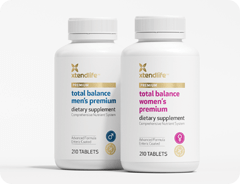Scientists have previously found that gut bacteria play a major role in whether or not we are fat or thin, and thin people’s bacteria is vastly different than those who are obese.
Studies last year found that the bacteria in our gut determines how we store fat, how blood glucose levels are balanced and how we respond to leptin and ghrelin, the hormones that determine whether or not we feel full or hungry. (Ref. 2)
The wrong microbes can impact the risk of obesity and diabetes from birth, but the mushroom from China shows promise that it might allow us to manipulate our fates and slow down the weight gain and manage our weight better.
A magic mushroom without hallucinations
In a study that appeared in the scientific journal Nature Communications, researchers from Taiwan’s Chang Gung University’s Department of Medical Biotechnology and Laboratory Science found that obese mice whose diets were supplemented with an extract of Ganoderma lucidum lost weight, even though they were eating a high-fat diet.
The team led by Chang Gun professor Lai Hsin-chih divided the rodents into six groups during the three-month study. Group A ate a regular diet without mushroom supplements, group B ate a regular diet with mushroom supplements, group C ate a high-fat diet without mushroom supplements and groups D, E and F ate high-fat diets with varying levels of mushroom supplements. (Ref. 3)
Interestingly, those in group B who ate a regular diet saw no change in body weight, but those in the high-fat diet groups supplemented with mushroom concentration saw their weight drop between 11 and 18 percent, with those receiving the highest levels of mushroom supplement losing the most weight.
According to Lai, the mushroom extract adjusted a single microbe in the gut to help the mice lose weight, mainly by increasing the good bacteria’s ability to help prevent toxins from entering the bloodstream from the intestines, which contributes to obesity.
Mushroom extract, researchers said, “may be used as prebiotics to reduce body weight gain, chronic inflammation and insulin resistance in obese individuals,” although human testing would be required to solidify the results.
Scientists find results promising
The Taiwan researchers also saw results when they transferred bacteria from the mushroom-fed mice to the mice that were not given the mushroom extract. When given the new bacteria, even though they hadn’t had the mushroom supplement, the second group of mice also lost weight.
“The microbiome is certainly a key player in weight gain and weight loss,” Prof. Colin Hill, a microbiologist at Ireland’s University College Cork, told BBC News. “It’s certainly involved in extracting energy from our food. (Ref. 1)
“I like the idea of some of these Chinese medicine stories coming back into science,” he added. “I love the idea of revisiting traditional medicines.”
Transforming gut bacteria could rival gastric bypass results
The idea of gut bacteria and weight loss also gained attention last year, when researchers from Harvard University and Massachusetts General Hospital found that changing the bacteria in the gut might have more of an impact on weight loss than gastric bypass surgery. (Ref. 4)
In a study that appeared in an issue of the journal Science Transitional Medicine, researchers found that using the Roux-en-Y method of gastric bypass had an almost immediate impact on gut bacteria, and generated microbes most often found in those without weight problems.
Those particular bacteria are believed to not only limit the calories extracted from food during digestion, but also boost metabolism so those calories are burned faster.
The results of the study suggest that by introducing the new, slimming microbes to an obese or overweight patient, it could trigger weight loss without dangerous and expensive surgery.
“The effects of gastric bypass are not just anatomical, as we thought,” said Dr. Lee Kaplan, senior author of the study and associate professor of medicine at Harvard Medical School. “They’re also physiological. Now we need to learn more about how the microbiota exert their effects.”
More focus on gut bacteria
With research offering definitive evidence of the real role gut bacteria play in obesity – a growing problem that over time will have a serious impact on the global health care industry – addressing that bacteria seems to be an important step in helping slow down the speed at which we as a population are gaining weight.
“We need to think about designing foods from the inside out,” Jeffrey Gordon of Washington University in St. Louis told Scientific American. “Keeping our gut microbes happy could be the elusive secret to weight control.” (Ref. 2)
Is your gut happy?
If you’re struggling to manage your weight, supporting and nourishing your own gut bacteria could make a difference in your weight loss goals.
Our Xtendlife Kiwi-Klenz is designed to specifically help improve digestion and bolster the good bacteria in the gut through prebiotics. Prebiotics feed our body’s existing probiotics and increase our body’s ability to produce new ones, so our immune systems – and waistlines – are healthier.
By improving digestion, it helps your body better absorb the nutrients you take in, so your cells have the energy they need, and will be less likely to send messages triggering episodes of hunger.
References:
- http://www.bbc.co.uk/news/health-33237991
- http://www.scientificamerican.com/article/how-gut-bacteria-help-make-us-fat-and-thin/
- http://www.taipeitimes.com/News/taiwan/archives/2015/06/26/2003621626
- http://www.diabeteshealth.com/news/altering-gut-bacteria-could-rival-bypass-surgery-effects/


 Supplements
Supplements Superfoods
Superfoods Bundles
Bundles










